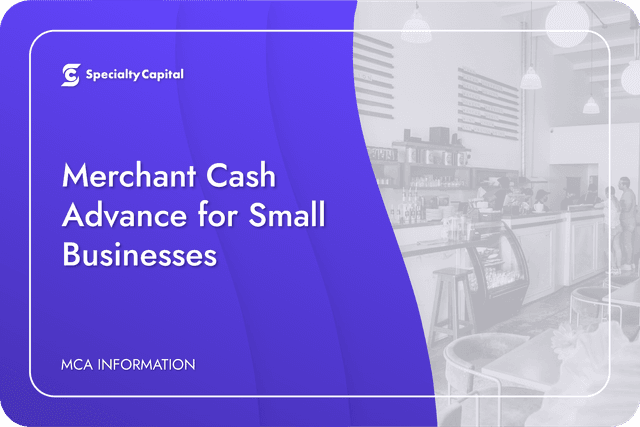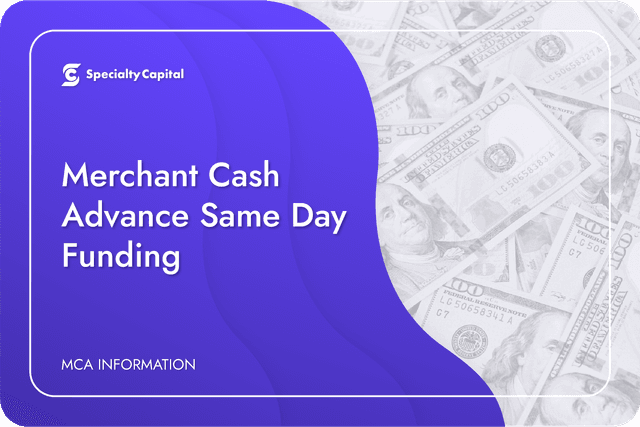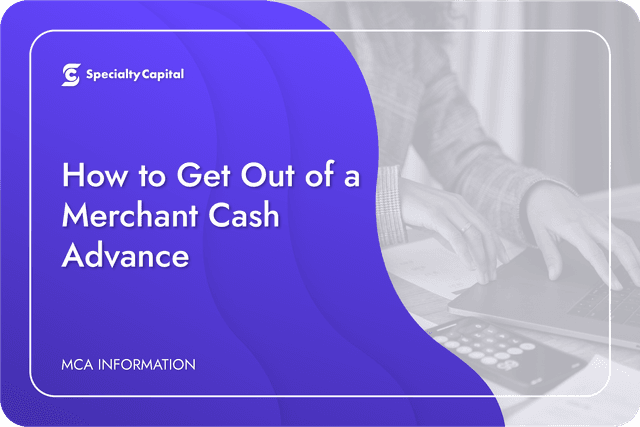A merchant cash advance (MCA) is a great financing option when you need same-day funding, but there are certain requirements, restrictions, and drawbacks you should know about before applying.
In this article, we’ll discuss the requirements you’ll need to satisfy and the process you’ll need to follow to secure same-day funding with an MCA.
The requirements for an MCA vary from funder to funder. However, in most cases you’ll need the following to secure funding:
If you have a driver’s license, passport, or government-issued ID card, you’ll need to make a copy and send it with your application. MCA funders require a valid ID to protect themselves from fraud.
When copying your ID, make sure your date of birth, full name, address, and ID number are all clear. If they’re not, the funder could refuse your application. Also, make sure the ID you submit is not expired.
Finally, if the funder you’ve chosen accepts different forms of ID, don’t be afraid to reach out and ask which form they prefer; doing so may hasten the application review process.
You’ll need to submit a copy of your business license too. If you have multiple business licenses because your company operates in different states, make a copy of every license. Again, you’ll need to make sure your business’ name, address, and account number are all easy to read, and the names and signatures of certifying officials must be clear as well.
A business plan is one of the most important requirements when securing a merchant cash advance. In it, you’ll need to explain what you intend to do with the funds if you’re approved for your financing and more. Your business plan must be detailed, clear, and feasible. If it doesn’t make sense or seems unreasonable, chances are you won’t be able to secure funding from any MCA funder.
If you need help with creating a thorough business plan, consider getting assistance from a consultant who specializes in business plan drafting. They should have a track record of success and experience in securing MCAs.
Additionally, you may need to provide a funding proposal to secure an MCA. A funding proposal essentially outlines how you intend to pay the money back if you secure an MCA. Like your business plan, this document has to be detailed and feasible. If you expect to see an uptick in card sales volume after putting your MCA to work, make this clear in your funding proposal.
Your credit card processing statements will be the most important component of your application because MCA repayments are directly linked to your card sales.
In most cases, you’ll have to pay a percentage of card sales over a predetermined period until the funds are remitted. For example, you may have to make a repayment that’s 5% of your total card sales on a weekly or biweekly basis. This means that the size of repayments will vary from week to week.
Usually MCA funders want to see three to six months of credit card sales so they can get an idea of how much revenue your business generates from card sales. If your card sales volume is high, and the total amount is sizable, the terms you get will be better than if your card sales history is spotty.
The funder you choose will want to know your business’ bank account and routing numbers, and they’ll want to see three months of bank statements. MCA funders require bank statements because they need proof of sufficient cash in your bank account. If you aren’t able to make repayments from card sales, the money for repayments would have to come from here.
In addition to credit card processing and bank statements, the MCA funder you’ve chosen may require other financial statements, namely income and profit-and-loss (P&L) statements. These statements will help the funder assess your business’ financial health, which they must do to determine how much risk they’ll assume by lending to you.
If your financial statements show that your business is doing well, it’s likely that you’ll be able to secure better lending terms. However, even though these documents are helpful, they’re not as important as credit card processing statements, mainly because these latter statements give funders the clearest picture of a borrower’s ability to make repayments in the future.
Finally, you’ll need to submit copies of your business’ most recent federal and state tax returns. If your business has been operating for less than a year, you may not be able to submit business tax returns, in which case your personal federal and state returns will be required. Again, if you do business in multiple states, you’ll need to submit copies of each state’s returns.
MCA funders ask for business tax returns because these official documents contain a lot of useful information, most notably how much income your business generated in the previous year. Also, MCA funders want to ensure the businesses they lend to are in good standing with the IRS, as tax liens can make it harder for an MCA funder to collect what they’re owed.
You may also need to submit your personal tax returns, but this will vary from funder to funder.
Determining how much money you need is essential. After all, you don’t want to borrow more than you need because the cost of your financing can be much more expensive than it needs to be. For example, if you secure an MCA for $100,000, and your factor rate is 1.2, you’ll have to pay back $120,000. Once you know why you need an MCA, you can determine a sufficient amount.
Even though you can get an MCA with good or bad credit, you should assess your business’ creditworthiness and finances before applying. If your credit is good and your business is in a good financial position, you should be able to get an MCA that’s relatively cheap.
Most importantly, you need to look over your card sales history to see if you’ve generated considerable volume and a high total amount from card sales. If you have, it’s likely you’ll get an MCA for the amount you’re looking for.
It’s best not to go with the first funder you find—shop around to get the best rate and terms you can find. Once you’ve considered all your options, choose the funder that’s most likely to approve the funds you need. However, if your goal is to save money, go with the funder that’s offering the lowest factor rate. Typically MCA factor rates are between 1.1 and 1.5, but this can vary depending on your business and finances.
Specialty Capital offers industry-leading prepayment discounts as well as multi-draw advances giving you more flexibility with your financing. Get in touch with us today to get started!
Once you know which funder is best for your business, fill out an application. Most MCA funders accept applications online, but go with whatever is best for the funder. And before you fill out your application, make sure you have all the required documentation, otherwise it may take longer to get the funds you need.
Upon approving your application, the funder will send over a funding agreement for you to sign. Review this document thoroughly at least twice before signing. For more guidance, you can hire a business attorney to go over the document for you. When everything looks good, sign on the dotted line. Once the funder knows you’ve signed, they’ll begin the disbursement process.
One of the most appealing aspects of merchant cash advances is they can put money in your business bank account the same day you’re approved. This is why MCAs can be a preferred financing solution for businesses that need cash fast to meet upcoming obligations.
And when it comes to speed, MCAs are better than all the other financing solutions. It could take you a week or more to secure term financing, and an SBA could take months to secure. And even if you get approved for a business credit card or line of credit, you won’t be able to use either right away.
MCAs are also popular among businesses with poor credit because you only need to have a suitable history of card sales to get approved. Virtually every other financing solution requires decent credit, but this isn’t the case with MCAs.
An MCA funder will just want to see that your business generates sufficient revenue from card sales because this is where their repayments will come from. However, if you can show that your business does have solid finances, you’ll probably be able to secure a lower factor rate and a more flexible repayment schedule.
Once you have the funds from an MCA in your business bank account, you can use them however you like. This isn’t the case with other financing solutions. For example, if you take out an SBA 7(a) or 504 financing, you can only use the funds for an approved purpose. If you don’t, you’ll be penalized, possibly severely.
But with an MCA, you don’t have to worry about misusing funds—the only thing that matters to the funder is that you pay them back on time.
If you don’t want to put up collateral to secure financing, and you don’t have money for a large down payment, going with an MCA over a traditional term financing is a great option. However, you may need to put up some collateral if your business’ finances are weak.
Additionally, you may have to sign a personal guarantee, wherein you agree that the funder has the right to seize and sell your assets if you default on the MCA.
Since merchant cash advances can be secured in 24 hours or less, many businesses use them as working capital. So if you need to meet upcoming obligations, consider an MCA. The funds can be used to pay employees, vendors, or creditors, and they can also cover the cost of inventory or rent.
Additionally, if your business gets saddled with an unexpected expense, an MCA can save you from having to use money that’s been allocated elsewhere. However, before you apply for an MCA, you need to know how much it’ll cost you. If you have to borrow a sizable amount, and your factor rate is high, it might be wise to consider another financing option.
If you have balances on existing business financing and credit cards, you can use the funds from an MCA to consolidate your debt. This is one of the key ways in which MCAs are different from other financing solutions. You can’t use regular business term financing or SBA funds for debt consolidation, and your business credit card’s limit may be too low.
But before you use an MCA for debt consolidation, do the math to make sure you’ll be saving money by doing so. An MCA can be expensive, and the last thing you want is debt consolidation costing more in the long run.
However, if you want your debt consolidated, and you’d rather have repayments coming out of your card sales, securing an MCA can be simple for your business.
If you need same-day financing, an MCA should be your go-to option. To secure one, all you need to present is three to six months of suitable card sales and other business documentation. Once you’re approved, just sign the agreement proposed by the funder. After you do, it should take 24 hours or less to get the funds in your business bank account.

Merchant Cash Advance for Small Businesses (Benefits & Requirements)
When small businesses need financing, they have a range of financing options to choose from. But many opt for a merchant cash advance (MCA) because...

Merchant Cash Advance Same Day Funding
A merchant cash advance (MCA) is a great financing option when you need same-day funding, but there are certain requirements, restrictions, and dra...

How to Get out of a Merchant Cash Advance
A merchant cash advance (MCA) can be great when you need short-term financing that’s easy to secure, but what happens if you want to get out of an ...